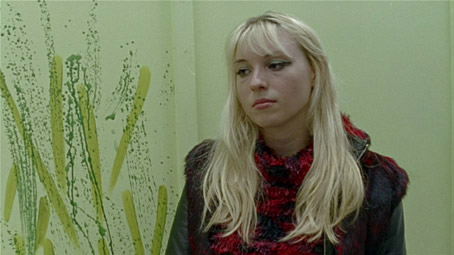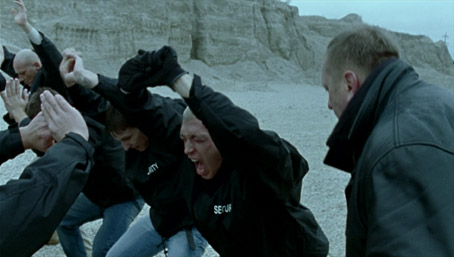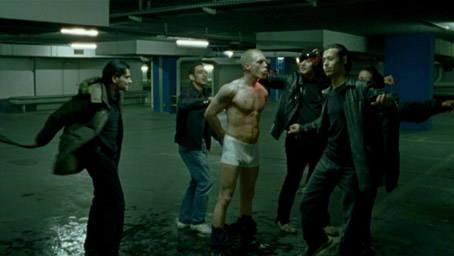"No matter where you go, there you are." |
|
Single mum Olga works as a nurse and lives with her mother and baby on a run-down Ukrainian housing estate. Pauli shares a Vienna flat with his mother and stepfather and is training as a security guard. Both are subjected to acts of humiliation at the hands of others, Olga when she supplements her meagre income by performing solo sex acts for an increasingly aggressive live internet feed subscriber, Pauli when he is stripped, mocked and soaked in beer by a group of youths while on night duty. Olga makes the decision to leave her child in her mother's care and head west to Austria in search of better paid work. Pauli looks to escape his various debts by taking a job with his stepfather Michael transporting gumball machines to and from the Ukraine. From an early stage the two parties seem destined to meet. They never do.

Import/Export is not a film about relationships triggered by chance encounters or people brought together by fate or shared experience, despite a degree of character common ground. Socially and financially both Olga and Pauli are in similar boats, though with little in the way of back story provided we can only speculate on whether they were born into poverty or have come to it through misfortune or misjudgement. Is the flat Olga shares with her mother a long-term family residence or all the pair could afford after her father's unspecified departure? Is the money owed all over town by Pauli, whose biological father is also absent, the result of poor debt management or genuine desperation? He appears genuinely willing to try any job if it will bring in a wage, but seems to have a gift for alienating people – in a scene that rings uncomfortably true, he takes a large fighting dog to his girlfriend's flat and derives considerable amusement from her terror of the creature, cheerfully ignoring her repeated demands for them both to leave and encouraging the animal to tear one of her cuddly toys to shreds. He certainly likes to see himself as the hard man, practicing his boxing moves in his room and attempting to intimidate a passer-by out of money, yet his humiliation at the hands of the car park assailants provides us with no satisfaction at seeing his macho bubble burst.
As Olga and Pauli swap locations, the film criss-crosses between their stories, sometimes finding direct parallels between their experiences. Yet from the moment they switch territories there's a clear imbalance to their social status. As a low-level immigrant worker, Olga is repeatedly treated as a second-class citizen by those who employ or work with her, accused of stealing by the brattish son of a wealthy family she cleans for, a job she is fired from by a mother who doesn't like the way the hired help talks to her boy. Her subsequent position as a domestic in a geriatric hospital brings her into conflict with territorial nurse Maria, who is quick to put her in her place when she shows kindness to one of the residents, and physically assaults her after she dances with male nurse Andi at the Christmas party. As visitors with cash in their pockets, however, Pauli and Michael are able to exercise a degree of control over their fate and even those they meet, which peaks when Michael hires a local prostitute to put on a similar display to the one performed to order by Olga at the front end of her story. In both cases Ukrainian girls are exploited by Austrian (or possibly German) males who regard them as little more than sexual slaves – whether this is a comment on Western exploitation of the post-Soviet East or something more specific to the relationship between the two countries I'm not in a position to say (the background provided by Finnish friends on the special relationship between their country and Russia, for example, completely changed how I viewed Aki Kaurismäki's Take Care of Your Scarf, Tatiana), but the placement and structure of these scenes suggests a very real purpose beyond criticism of the economics of gender exploitation.

By focussing on the experiences of its two leads, the film wears its two hour twenty minute running time well. A strong forward momentum is maintained by cross-cutting between the stories and an economical approach to the storytelling, with Olga's decision to leave and her subsequent departure covered in a few brief and wordless shots, and her feelings about being so far from home and family vividly captured in the song she sings down the phone to her daughter and the abruptness with which she hangs up. Segregated by their nationality and new social status – Olga is regarded as an immigrant worker, Pauli as little more than a tourist – the two emerge as socially secluded and lonely figures whose future remains uncertain even at the film's end.
In its exploration of themes of isolation and exploitation, the film is inevitably downbeat in tone but nowhere near as bleak as advance word has suggested. Warnings about the adult content should definitely be heeded, however, with the early internet porn sequences and Michael's bedroom encounter with the Ukrainian prostitute definitely not the stuff of daytime TV and likely to startle the unprepared. The decision to shoot in real hospitals, geriatric wards and internet sex parlours is likely to add to viewer discomfort, as a young female porn worker graphically masturbates for the watching web cam, and an elderly man who appears only vaguely aware of the camera's presence has his soiled nappy brusquely removed.
Despite what you may have heard or surmised, it would be wrong to label Import/Export as difficult cinema, as despite the confrontational nature of some of its content, its pace and narrative flow are a lot more audience-friendly than the above might suggest. Emotionally it keeps its lead characters at arm's length, but we engage with them anyway because everything about them and their experiences feels utterly authentic, the result in part of the savvy casting of Ekateryna Rak and Paul Hofmann, non-professionals who bring elements of their own lives to the roles (Rak is an ex-nurse; Hofmann is unemployed and has a fondness for brawling and fighting dogs). Critical praise for the film has perhaps been a little loose with the superlatives, and the frequency with which the term 'horrific' pops up probably says more about the sensitivity and life experiences of review writers than it does of the film's themes or content. But this is still a compelling, precision directed and sometimes haunting work whose moments of poetry, tenderness and even offbeat humour (the opening image of a man repeatedly attempting to kick-start a motorbike could have come straight from Roy Andersson's delicious You, the Living/Du levande) linger long after the final credits have rolled.
A tricky one. While it's commendable to see a film like Import/Export getting a Blu-ray release, the transfer here is not the best advert you'll see for the medium. For much of the film the image is on the soft side, the result in part of (apparently) shooting on Super-16mm in available light, which presumably also accounts for the occasionally unnatural colour timing and softer contrast (although I can't help suspecting the green tinge of the geriatric ward is deliberate). But while 16mm may not have the resolution of 35mm or even high-def video, it can still pack a punch, and suspicions about that a tape or film print master rather than the negative were the source of this transfer are enhanced by the slight softness of the opening title text, which on high-def transfers would usually be Letraset crisp. Intermittently the is a noticeable improvement in definition – the shots of Paul shadow boxing are good examples – and it's here that the detail is at its crispest and the colour and contrast are their punchiest. How much of this is down to shooting by available light on high speed stock is uncertain. The picture is always clean and the cinematography – a very effective mixture of handheld travelling shots and formal compositions, the work of acclaimed cinematographer Ed Lachman – survives the dips in sharpness, but it's still just a little disappointing.

The DTS surround soundtrack, on the other hand (I'm presuming Master Audio 5.1, but I don't have the HD amp or the box artwork to confirm this at present), is excellent, not in the show-off action movie way but in the pristine reproduction of location sound. Exteriors in particular have sometimes vivid and widely spaced location atmospherics, whether it be the quiet howl of wind or the gentle hum of distant traffic. Separation is sometimes very distinct, as with voices in the sex parlour or passing cars in the street, and the bar-room music to which Pauli drinks and dances has phenomenal punch – if you're system's up to it then the volume, reverb, clarity and top-heavy bass are as close to the real thing as I've yet heard booming from my speakers.
Interview with Ulrich Seidl (24:08)
A 720p interview with the film's very open and amiable director, who talks about how the project came together, the casting, the development of the stories, the time spent preparing the film, the blending of fiction with documentary, the experience of filming in a real geriatric hospital, the editing and the importance of confronting an audience with the truth. There's some interesting info on how actors were prepared for key scenes, and Seidl convincingly argues that some of the more uncomfortable sequences need duration to be truly effective. A very useful companion to the film.
Trailer (2:00)
Also 720p, this is an intriguingly assembled piece in which sequences from the film slide in opposite directions while their soundtracks are hypnotically layered over each other. Almost a small gallery piece in itself.
I was neither as horrified nor startled by the film as some reviewers have claimed to be, perhaps because I've seen enough of the darker side of exploitation to no longer be shocked by something I instantly recognise as authentic. It's this realism, together with Ulrich Seidl's assured direction and confident storytelling skills, that make Import/Export one of the most quietly compelling films of the past couple of years. Whether the Blu-ray offers any pictorial advantages over the DVD release is another matter – not having compared the two I can't say for sure, but it's not one you'll be using to persuade friends to make that jump to HD.
|